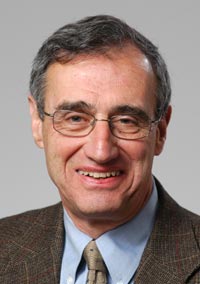Berkeleyan
Two Faculty Research Lectures set for April
Classicist Erich Gruen speaks April 7 on Jews and the ‘Other’
![]()
| 31 March 2004
| |  |
Since the founding of the campus's Faculty Research Lectureship in 1912, the Berkeley Academic Senate each year celebrates research excellence by honoring several faculty members whose work they hold in high esteem. This month, the two 2004 winners will share their findings and insights with campus audiences.
The first talk, at 5 p.m. on Wednesday, April 7, in the Berkeley Art Museum Theater, will be given by history and classics professor Erich Gruen, speaking on "The Jew and the 'Other' in Antiquity: Alienation or Integration?" He plans to contrast a common stereotype of Jews in antiquity — that they kept themselves apart from other nations — with the strong strain of openness to other societies and the gentile world in Jewish history and tradition, beginning in ancient times.
History chair Jon Gjerde — introducing his colleague as a 2004 lecturer to the Academic Senate last spring — praised Gruen's wide range of interests. During his nearly four decades on the Berkeley faculty, Gruen has written extensively on Roman and Greek political, diplomatic, and intellectual history. He has investigated, among other topics, the myth of Alexander the Great; the Roman playwright Plautus; and the question of how much "democracy" there was in republican Rome. In recent years he has turned his attention to Jewish life and literature in the ancient world.
Gjerde further noted his colleague's talent for turning received wisdom on its head, and the "extraordinary" accessibility of his writings. "Although his subjects are those a layman would find fairly arcane," Gjerde said, "his engaging, conversational style opens a door that invites everyone, whatever the state of his or her previous knowledge, to enter."
The second 2004 Faculty Research Lecture will be given on Tuesday, April 13, when David Wake, professor emeritus of integrative biology, talks on animal lineages and implications for evolutionary and conservation biology.

